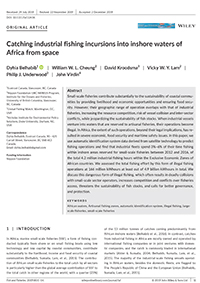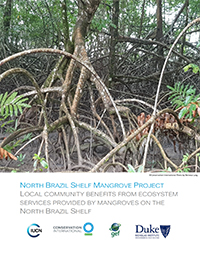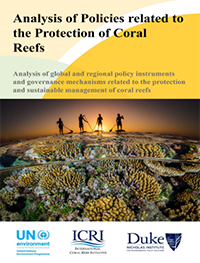Publications
Blue Carbon Conservation in West Africa: A First Assessment of Feasibility
The loss of blue carbon ecosystems results in significant levels of carbon emissions and decreased supply of other ecosystem services. This study aims to provide a first step toward increasing the knowledge of the region’s blue carbon stocks, with a focus on mangroves, and of their financial value based on their carbon storage benefit alone.
Catching Industrial Fishing Incursions into Inshore Waters of Africa from Space
Small‐scale fisheries contribute substantially to the sustainability of coastal communities by providing livelihood and economic opportunities and ensuring food security. However, their geographic range of operation overlaps with that of industrial fisheries, increasing the resource competition, risk of vessel collision and inter‐sector conflicts, while jeopardizing the sustainability of fish stocks. When industrial vessels venture into waters that are reserved to artisanal fisheries, their operations become illegal.
Assessing Progress on Ocean and Climate Action: 2019
The Progress Report on Ocean and Climate Action for 2019 addresses progress (or lack thereof) in nine categories.
Local Community Benefits from Ecosystem Services Provided by Mangroves on the North Brazil Shelf
This analysis seeks to evaluate the size and distribution of the services the mangrove ecosystem is providing to local communities in Suriname and Guyana. The study involves three components: (i) the description, from the scientific and grey literatures, of the mangrove ecosystem services specific to local communities in Guyana and Suriname; (ii) identification of methods that could be used to estimate the economic values of these services, and estimation of the economic values for mangrove forests’ fisheries support ecosystem service; and (iii) identification of local beneficiaries of these services.
Initial Measures of the Economic Activity Linked to Bangladesh’s Ocean Space, and Implications for the Country’s Blue Economy Policy Objectives
To support the Government’s effort to translate its blue economy aspirations into operational policies, an accounting exercise was conducted to provide initial measures of Bangladesh’s ocean-linked economic activity, as a baseline by which to set targets. The results suggest the contribution of ocean-linked economic activity in Bangladesh in 2014-2015 was just over 3% of national gross value added, derived relatively evenly from tourism and recreation, capture fisheries and aquaculture, transport and energy.
Analysis of Policies Related to the Protection of Coral Reefs
West Africa's Coastal Bottom Trawl Fishery: Initial Examination of a Trade in Fishing Services
Many states attempt to increase the economic benefits generated from their fish resources through foreign fishing arrangements that can be characterized as trades in fishing services. This paper provides a first assessment of the net economic benefits in a static analysis from one of the oldest such arrangements in West Africa: the coastal bottom trawl fishery. Focusing on the coastal states of Guinea-Bissau, Guinea, Sierra Leone and Liberia, the total resource rent (RR) generated by foreign fishing in 2015 was estimated and then decomposed for the two participants in the trade: the coastal states (RRCS) and the foreign companies (RRFC). The implications from this review are that significant trades are occurring and even increasing without the minimum data required for West African coastal states to adequately evaluate the terms of trade, nor their sustainability.
Mapping the Global Distribution of Locally Generated Marine Ecosystem Services: The Case of the West and Central Pacific Ocean Tuna Fisheries
Ecosystem service maps are instrumental for the assessment and communication of the costs and benefits of human-nature interactions. This article in the journal Ecosystem Services proposes an integrated way of assessing and mapping global flows of marine ecosystem services. It proposes a conceptual framework that integrates ecosystem service provision principles with value chain analysis and human well-being assessment methods, while considering the spatial dimension of these components in ecosystem service mapping. It applies this framework to the case of seafood provision from purse seine tuna fisheries in the Western and Central Pacific Ocean.
Contribution of Fisheries to Food and Nutrition Security: Current Knowledge, Policy, and Research
In the context of the recently agreed-on United Nations 2030 Agenda for Sustainable Development, which includes the goal to end hunger, achieve food security, and improve nutrition, this report synthesizes the current understanding of capture fisheries’ contributions to food and nutrition security and explores drivers of those contributions. Further, the report examines how ensuring the sustainability of these fisheries—they provide nearly one-fifth of the average per capita animal protein intake for more than 3.1 billion people—and recognizing any synergies between conservation and food security objectives could be important considerations during policy development.
Toward a Blue Economy: A Pathway for Sustainable Growth in Bangladesh
This report aims to synthesize current theory and practice of the blue economy concept to govern economic activity linked to the ocean, and to provide a framework for the Government of Bangladesh to analyze its potential.










